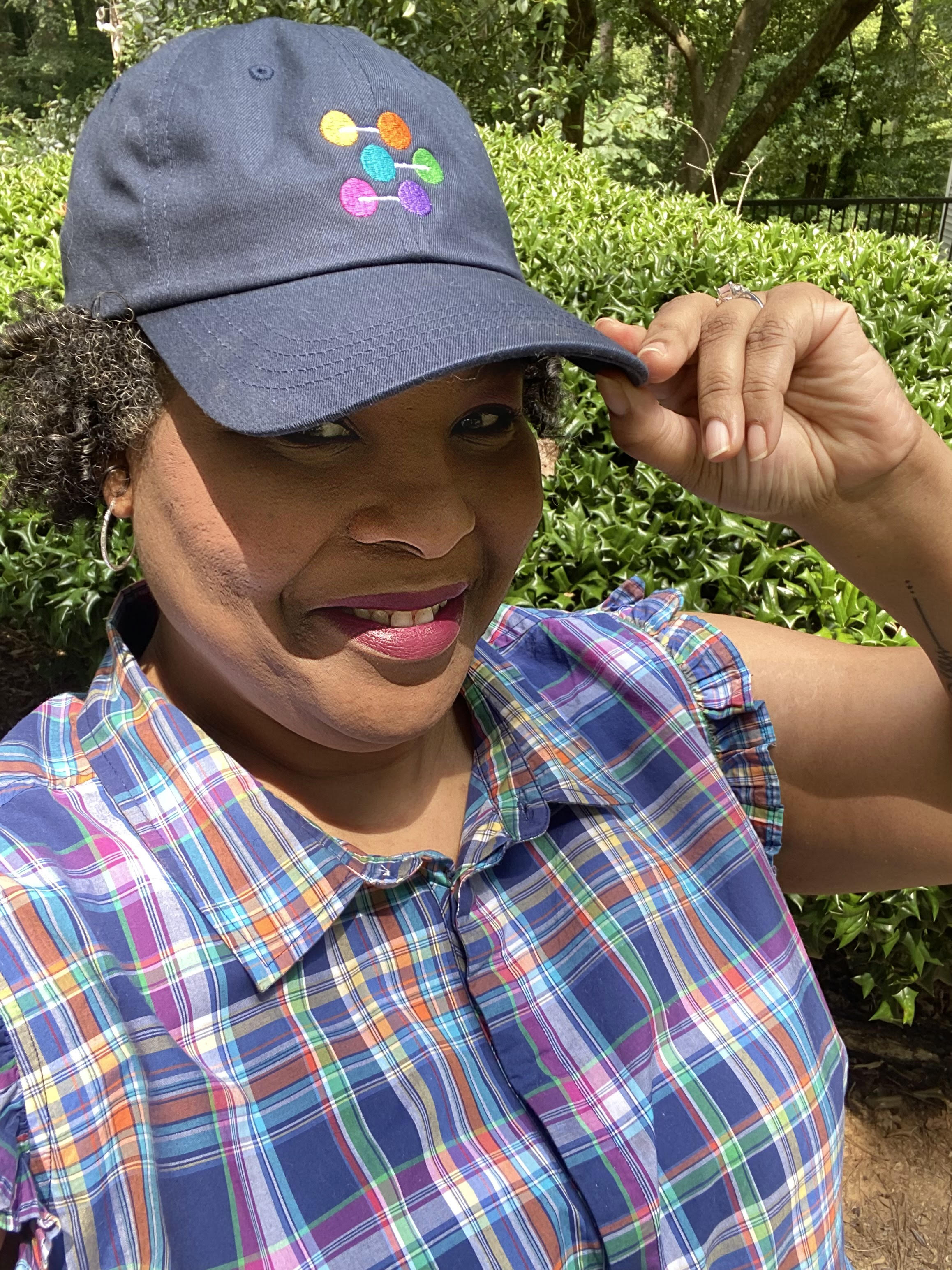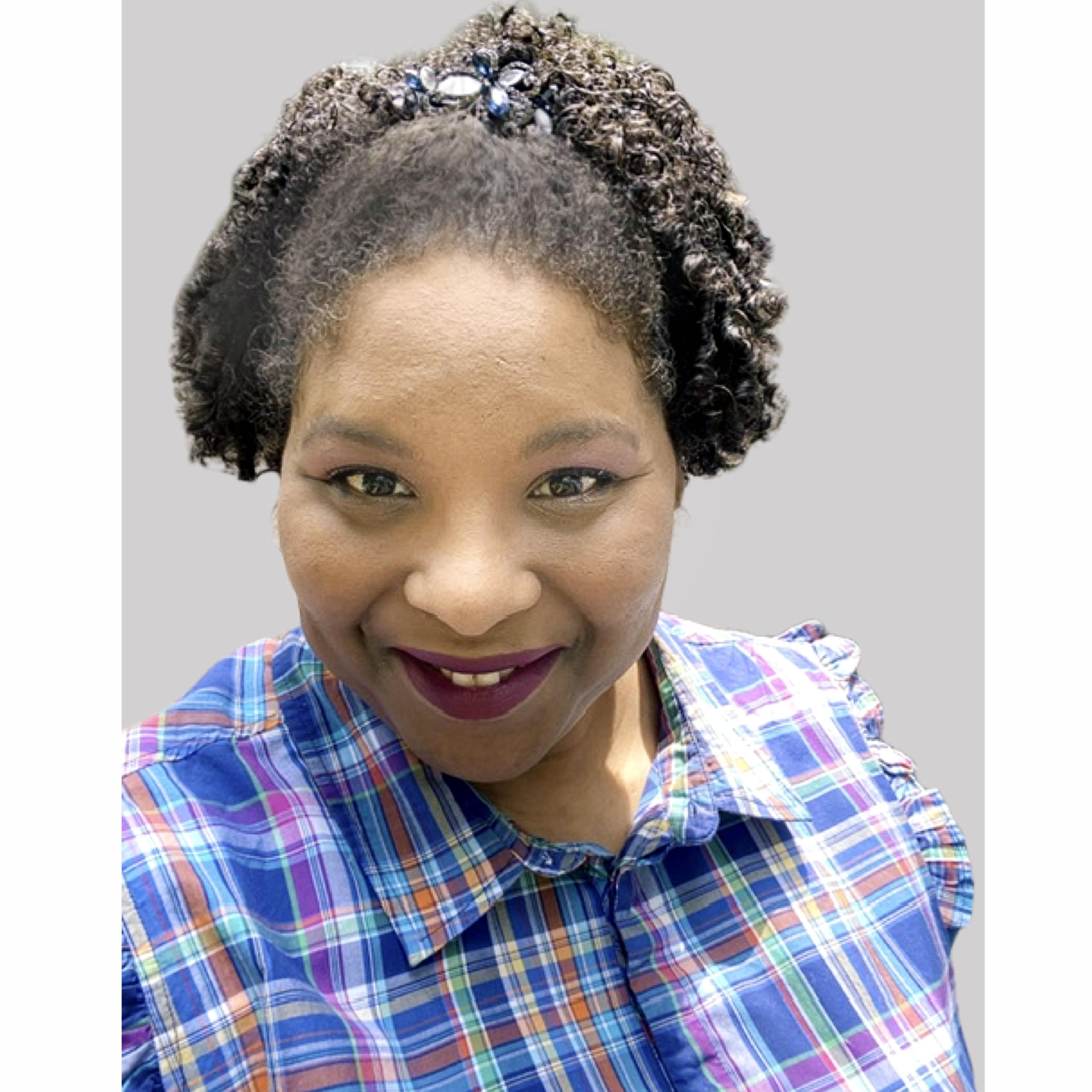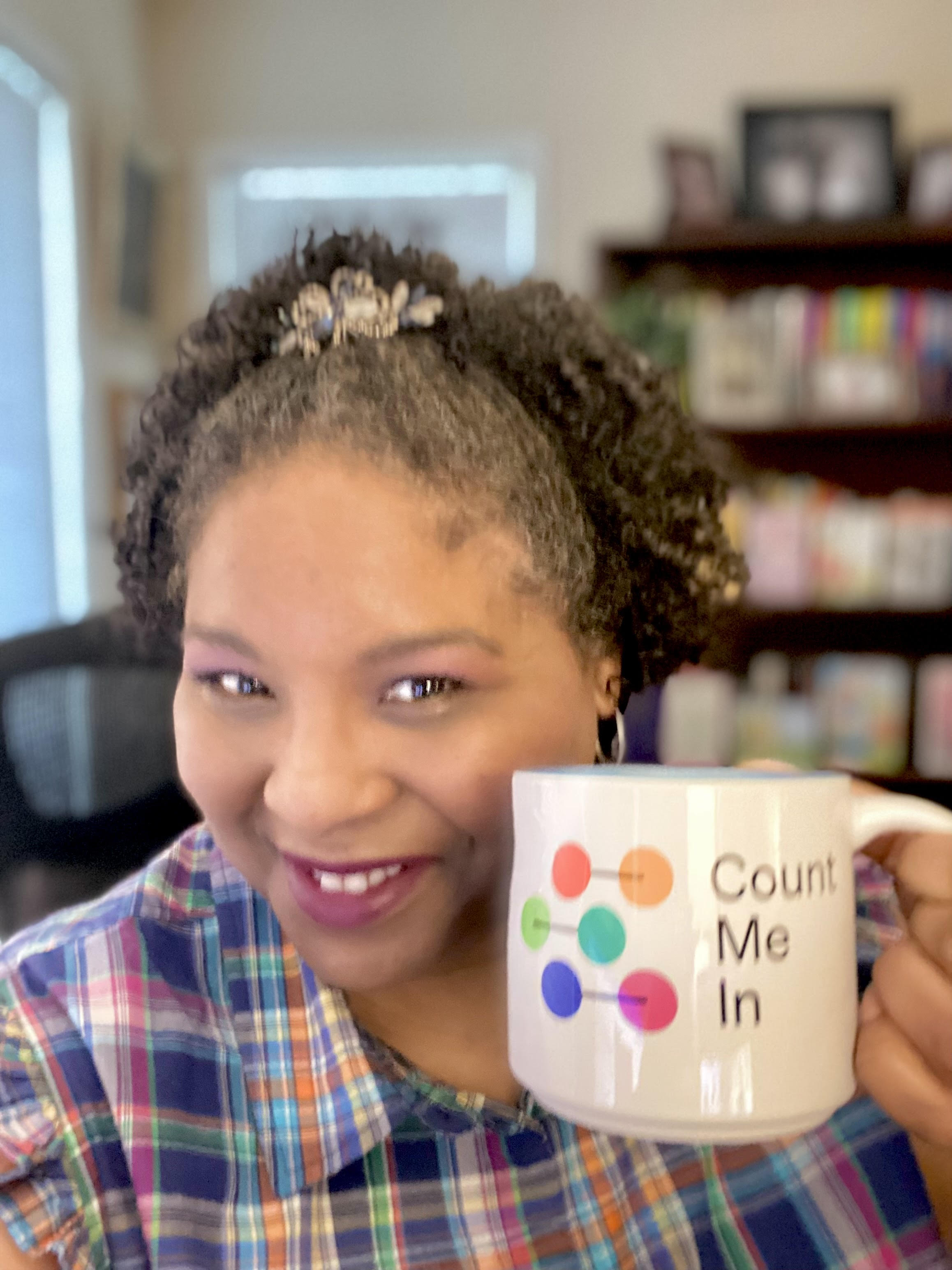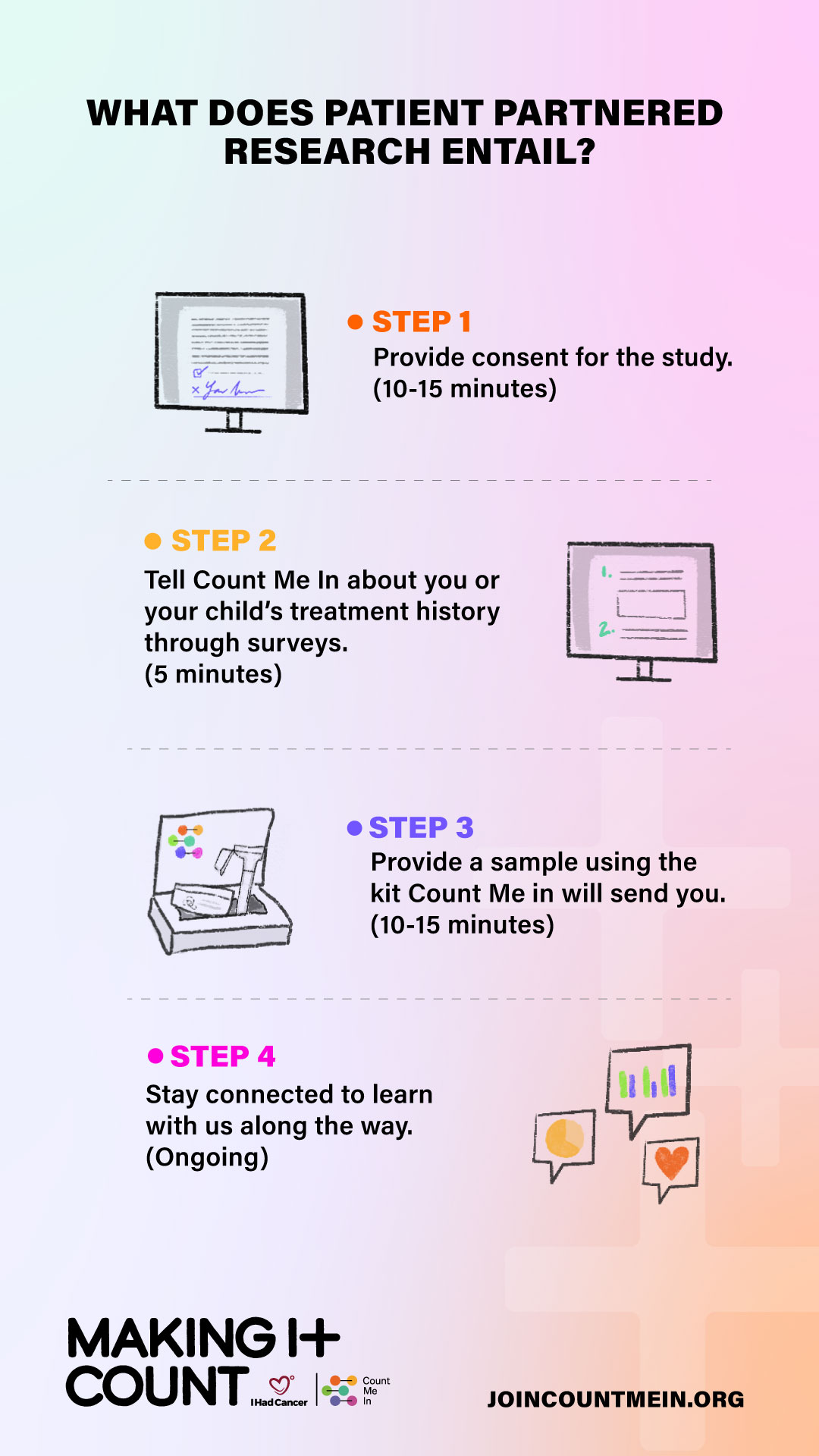Megan-Claire Chase | My Stage II Breast Cancer Journey
Megan-Claire Chase (aka Warrior Megsie), a breast cancer survivor and cancer community advocate, discusses her cancer journey. Read on to learn more about her cancer survivorship/caregiving experience, and why she chose to join Count Me In, a patient-partnered cancer research initiative.
What is your cancer story?
Megsie: I was diagnosed with Stage II Invasive Lobular Breast Cancer in my left breast two months after my 39th birthday, so I feel like I stopped aging at 38. It was strange for me to keep being referred to as a “young adult” in the cancer community, but I started understanding what it meant to fit into the “adolescent and young adult” (AYA) cancer community bucket. When I was first told the news, I was like “What is that? What is lobular?” This whole “cancer awareness” movement does not really make us aware of what breast cancer is really. We need more education about the details. How many people know that there are different subtypes of breast cancer?
At the time of my diagnosis, I had just broken up with someone. I’d done all this personal growth (including some unwanted internal cancer growth) and was ready to try to get back on the dating scene. When I got the cancer call, I had already known something was off. I hadn’t been feeling like myself for about two, two and a half years. Strange symptoms, but my doctors dismissed everything I was saying. “Just lose weight, eat better, and get more sleep.” I’m like “The whole POINT is that I’m gaining weight! That’s not normal for me!”
I come from a very cancerous family. My mother had ovarian cancer when she was pregnant with me. My maternal grandmother had cervical cancer and ultimately died of lung cancer. My mother now has a rare blood cancer. I wasn’t surprised that I got cancer, I was just surprised by the type of cancer I had. I was prepared for ovarian or cervical cancer and had never once thought about breast cancer.
How did your doctor explain your diagnosis to you?
Megsie: When I received the call on September 14, 2015, my doctor told me that I had ductal cancer. I’m thinking “Well your ducts and your lobes are two different things. I thought I had lobular cancer!” I did some research, lobes are the glands in the breasts that produce milk and ducts are the tubes that carry milk to the nipple. Ductal is the most common subtype of breast cancer, and invasive lobular is the cause of only 10-15% of breast cancer diagnoses. It’s rare for black women to be diagnosed with the lobular subtype of breast cancer.
This still didn’t explain why my doctor had mentioned ductal cancer to me, so I asked her about it. “Oh, well we’re going to treat your cancer like it’s ductal cancer.” I remember being upset and asking why they were treating my cancer like a completely different subtype. “Well, there’s not enough research about it and your cancer is growing very rapidly, so the best way to go about it is to throw as much chemo at it as possible.” Eventually, doing some more research soothed my fears about not getting specific enough treatment.
Where are you on your cancer journey now?
Megsie: I’m getting near the seven-year mark in October of 2023. I think about my “survivorship” every six months. I think about cancer every single day, especially as I learn to deal with my new curly hair texture. It’s been a lot, changing my hair routine and learning how to wash it / what products to use. I get upset sometimes, especially when people say “Your new hair looks so good on you!” Like that’s great. But every time I look in the mirror, I’m reminded of what the chemo did to me and what cancer took from me.
I’m also in pain 24/7 which has not yet fully been managed. People ask “How are you able to do all the stuff that you do when you’re in pain?” Well, it’s like any disability. You figure out alternate ways of making things work. I’m single. I can’t take certain medications because I have to work full-time and need a somewhat clear head. Does it suck? Absolutely. Is it hard? Yes, but I’ve had to learn to either say no to things or factor in the two to three days that I need to recover.
Cancer definitely impacted my quality of life and I feel like that’s not talked about enough. There are a lot of people who can somewhat revert to their pre-cancer selves physically. But then there are others, like me, for whom cancer changed everything.
Why do you want your cancer experience to count? What does joining Count Me In mean to you?
Megsie: My story is my legacy. Cancer took away my fertility, so I will never have human children. I speak in a way that makes others listen. I’ve been able to get to some tables in the cancer community where I was the only black person there. This is truly upsetting and frustrating to me, but at least I am able to be the voice that resonates with my community in those spaces.
My story counts because I matter. I often make videos on social media and like to end them with “Don’t forget that you matter.” This country has really made it very obvious that for people who look like me, we don’t matter. But we DO, and we should have our experiences counted.
My story counts because there needs to be more research about all types of breast cancer, not just the most common diagnoses. Learning that I had invasive lobular breast cancer, one of the rarer forms of breast cancer, terrified me. I wasn’t sure if the general breast cancer treatment process would be accurate for me since most breast cancer research studied individuals with the ductal variety of breast cancer. Organizations like Count Me In ensure that my story, although less common than the story of someone with ductal breast cancer, is still counted. My experience is valued and will be used to research more accurate treatments for the next person diagnosed with invasive lobular breast cancer.
I have a great connection with the Count Me In team and recently worked with them on an episode of “Stories From The Stage” that aired on TV last month. It was amazing. I used to be deathly afraid of participating in medical research and having my DNA stored somewhere. What’s going to happen to it? In the black community, we have a strong fear of being treated as guinea pigs by the scientific community. But then I was diagnosed with cancer, then my mother was diagnosed with another cancer, and then my mother enrolled in a clinical trial, and then I had issues post-cancer and wasn’t able to tolerate the medication that was given to me. That’s when I really started to understand why our genetics are important. It’s so important that people who look like me are included throughout the entire research process from beginning to end. Black women are more likely than other races to be diagnosed with cancer, but we are rarely represented in the research process - limiting the medical community’s true understanding of cancer. An eventual cancer cure requires everyone to be represented.
As a part of their Amplifying Black Voices Across Cancer campaign, Count Me In brought me and six other cancer patients of color on a trip to Boston. While there, we visited their office and research labs. I met so many people who worked there from the lab technicians to the scientists. Their team is so diverse, full of people from all different communities. Just seeing all those people made me feel even more relieved and protected. Then, we actually saw where they store the participant's medical samples. One of the questions someone asked was “What happens if there’s a natural disaster, or something in the safety procedures doesn’t work?” The Count Me In Team replied, “We have a plan B, C, and D to protect all the patient samples that we collect.” When I got to see everything up close, it confirmed to me that Count Me In was the real deal and that I could feel safe about them having my medical information. As a patient, you rarely get to see the precautions that are taken and the machines that are used behind the scenes to complete this in-depth research. I was blown away quite frankly.
What motivational message do you have to others in the cancer community?
Megsie: Anyone diagnosed with cancer feels like a deer in headlights initially. You’re just trying to stay alive and simultaneously understand all this information that’s being thrown at you. There’s another window for those who are able to enter either survivorship or a long-term cancer maintenance stage. For those of us in survivorship or who have been labeled “No evidence of disease,” you really need those connections in cancer land. Our friends, family, and employers don’t understand why so many of us are still impacted by cancer. They don’t understand why we are still thinking about our cancer journey daily. They don’t understand how much having cancer has changed our quality of life.
It’s okay to continue to talk about how cancer affects your life, but also seriously consider getting professional help. Whether you realize it or not, there’s depression, anxiety, and PTSD after cancer. None of this is talked about enough, especially the PTSD side effects. It took me a while to realize that cancer traumatized me. It's a trauma to your physical, mental, and emotional health.
There’s also this constant grieving of friends that you make in the community. Something that isn’t talked about is that some of your friends will die. That’s just a fact. This makes some people not want to make friends in the cancer community. But I’m so thankful for all of the friendships that I do have. Even the friends that I lost, their cancer took them away. I was so much better for knowing them. You really need those connections because we can talk about the darkness with each other without friends and family saying “Don’t talk about that, you’re bringing that into existence.” No, this is my reality. This is what I need to process. Cancer is a lifelong thing that you will constantly be processing, especially as your body may end up with other illnesses stemming from that original diagnosis.
What word would you use to describe your cancer journey and why you count?
Megsie: I would use the word resilience. I think about how cancer has taken my career, my health, and my fertility. Yet somehow, I keep getting up and wanting to advocate for myself and for others in the cancer community. There’s just something inherently in me. People often say “Oh, going through my cancer experience made me stronger.” Well, I was already a strong person. I didn’t need to be stronger. But my cancer experience did let me know that even in such pain, darkness, grief, and loss, there is still something within me that wants to help give a voice to others. Something that makes me want to let others know that they count.
People will tell me that their story doesn’t matter, but I tell them that it does! If you tell your story from your perspective, it’ll resonate with at least one other person. You may end up changing that person’s whole outlook on life. For me, part of telling that story is joining Count Me In’s patient-partnered research initiative, and encouraging other black cancer patients to participate.
Count Me In is a nonprofit patient-partnered research program that aims to accelerate the pace of cancer research by collecting and analyzing comprehensive data from patients with cancer. The program is a collaborative effort between patients, caregivers, researchers, and clinicians. To join the Making It Count movement, visit JoinCountMeIn.org.












Megan-Claire Chase (or Megsie) is a breast cancer warrior, and it has been one year and four months since she was declared NED (no evidence of disease). She was diagnosed with Stage IIA Invasive Lobular, ER+/PR+ and HER2- in 2015 and finished active treatment two days before her 40th birthday in 2016. She was medically induced into menopause in February 2017 due to complications with post treatment. Megsie is a true STEEL magnolia in every sense of the word and a single girl living in Atlanta, GA. She has a cat, Nathan Edgar, who IS her child.